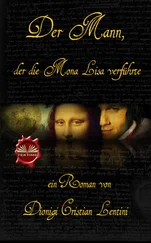On this day, Baroncelli drew a totally different impression from the statue. He saw the coldness in David’s eyes as the boy stared down at the head of the slain Goliath; he could see the keenness of the great sword in David’s right hand.
Which role shall I play today? Baroncelli wondered. David, or Goliath?
Beside him, Francesco de’ Pazzi was pacing the floor with his hands clasped behind his back and his small eyes glaring downward at polished marble. Giuliano had best come soon, Baroncelli reflected, or Francesco would begin muttering to himself.
But Giuliano did not appear. The servant, a comely youth, as well oiled as every part of the Medici machinery, returned with a look of practiced sympathy. “Signori, forgive me. I am so sorry to tell you that my master is currently indisposed and cannot receive company.”
Francesco barely managed to replace his fright with joviality in time. “Ah! Please explain to Ser Giuliano that the matter is most urgent.” He lowered his tone as if confiding a secret. “Today’s luncheon is in the young Cardinal Riario’s honor, you see, and he is sorely disappointed that Ser Giuliano will not be attending. The Cardinal is at the Duomo now with Ser Lorenzo, asking after your master. Mass has been delayed on this account, and I fear that should Ser Giuliano fail to come with us now, the Cardinal will take offense. We would not want him to report this to his uncle, the Pope, when he returns to Rome…”
The servant nodded graciously while wearing a small frown of concern. Yet Baroncelli sensed he was not quite convinced he should further disturb his master. Francesco clearly sensed the same, for he pressed harder. “We are here at the behest of Ser Lorenzo, who bids his brother come, and swiftly, as we are all waiting…”
The youth signaled his understanding of the urgency with a quick lift of his chin. “Of course. I will relay all that you have said to my master.”
As the lad turned, Baroncelli gazed on his employer, and marveled at his talent for duplicity.
Soon footsteps sounded on the marble stairs leading down to the courtyard, and then Giuliano de’ Medici stood before them. Though his brother’s features were imperfect, Giuliano’s were without flaw. His nose, though prominent, was straight and nicely rounded at the tip, and his jaw was strong and square; his eyes, large and golden brown, were framed by long lashes that were the envy of every Florentine woman. Delicate, well-formed lips rested atop even teeth, and his hair was full and curling, parted down the middle and brushed back to better show his handsome visage.
At twenty-four, life was good to Giuliano; he was young, lively, fair of face and voice. Yet his good nature and sensitive character ensured that he never made another feel inadequate. Indeed, his cheerful, generous nature made him generally loved by Florence’s citizens. While he might not have shared his brother’s painful brilliance at politics, he was astute enough to use his other attributes to gain public support. Were Lorenzo to die, Giuliano would have no difficulty in taking up the reins of power.
Over the past few weeks, Baroncelli had tried hard to despise him, and failed.
This morning the faint light that had begun to paint the bottoms of the columns revealed that Giuliano’s glory was sorely dimmed. His hair had not been combed, his clothes had been hastily donned-and his eyes were noticeably bloodshot. For the first time in Baroncelli’s memory, Giuliano did not smile. He moved slowly, like a man weighed down by heavy armor. Icarus , Baroncelli thought. He soared too high and has now fallen, scorched, to Earth .
Giuliano spoke, his normally melodic voice hoarse. “Good day, gentlemen. I understand Cardinal Riario has taken offense at my absence from Mass.”
Baroncelli felt a strange sensation in his chest, like that of his heart flipping over. Giuliano looked like a beast resigned to the slaughter. He knows. He cannot possibly know. And yet… he knows…
“We are so sorry to disturb you,” Francesco de’ Pazzi said, his hands clasped in an apologetic gesture. “We have come at the behest of Ser Lorenzo…”
Giuliano released a short sigh. “I understand. God knows, we must take care to please Lorenzo.” A glimmer of his old self returned, and he added with apparently genuine concern, “I only hope it is not too late to reassure the Cardinal that I hold him in the highest regard.”
“Yes,” Baroncelli said slowly. “Let us hope it is not too late. Mass has already started.”
“Let us go, then,” Giuliano said. He gestured for them to move back toward the entryway. As he lifted his arm, Baroncelli took note that Giuliano had dressed so hurriedly that he wore no sword at his hip.
Out they went, the three of them, into the bright morning.
The scowling man who had been waiting out in the loggia glanced up as Giuliano passed. “Ser Giuliano,” he called. “A word with you; it is most important.”
Giuliano looked over and clearly recognized him.
“The Cardinal,” Francesco urged frantically, then addressed the man himself. “Good man, Ser Giuliano is late for an urgent appointment and begs your understanding.” And with that, he took Giuliano by the arm and dragged him away down the Via Larga.
Baroncelli followed. He marveled that although he was still terrified, his hands no longer shook, and his heart and breath no longer failed him. Indeed, he and Francesco joked and laughed and played the role of good friends trying to cheer another. Giuliano smiled faintly at their efforts but lagged behind, so the two conspirators made a game of alternately pulling and pushing him along. “We must not keep the Cardinal waiting,” Baroncelli repeated at least thrice.
“Pray tell, good Giuliano,” Francesco said, catching the young man by his sleeve. “What has happened to make you sigh so? Surely your heart has not been stolen by some worthless wench?”
Giuliano lowered his gaze and shook his head-not in reply, but rather in indication that he did not wish to broach such matters. Francesco dropped the subject at once. Yet he never eased their pace, and within minutes, they arrived at the front entry of the Duomo.
Baroncelli paused. The thought of Giuliano moving so slowly, as though he were heavily laden, pricked at him. Feigning impulsiveness, he seized the young Medici and hugged him tightly. “Dear friend,” he said. “It troubles me to see you unhappy. What must we do to cheer you?”
Giuliano gave another forced little smile and a slight shake of his head. “Nothing, good Bernardo. Nothing.”
And he followed Francesco’s lead into the cathedral.
Baroncelli, meanwhile, had laid one concern to rest: Giuliano wore no breastplate beneath his tunic.
O n that late April morning, Giuliano faced a terrible decision: He must choose to break the heart of one of the two people he loved most in the world. One heart belonged to his brother, Lorenzo; the other, to a woman.
Though a young man, Giuliano had known many lovers. His former mistress, Simonetta Cattaneo, wife of Marco Vespucci, had been hailed as the most beautiful woman in Florence until her death two years ago. He had chosen Simonetta for her looks: She was fine-boned and fair, with masses of curling golden hair that fell far below her waist. So lovely was she that they had carried her to her grave with her face exposed. Out of deference to the husband and family, Giuliano had watched from a distance, but he had wept with them.
Even so, he had never been faithful. He had dallied with other women and occasionally he had reveled in the talents of whores.
Now, for the first time in his life, Giuliano desired only one woman: Anna. She was handsome, to be sure, but it was her intelligence that had entrapped him, her delight in life, and the greatness of her heart. He had come to know her slowly, through conversation at banquets and parties. She had never flirted, never attempted to win him; indeed, she had done everything possible to discourage him. But none of the dozens of Florentine noblewomen who vied and simpered for his affections matched her. Simonetta had been vapid; Anna had the soul of a poet, a saint.
Читать дальше
Конец ознакомительного отрывка
Купить книгу












